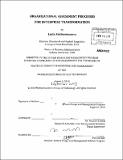| dc.contributor.advisor | Ricardo Valerdi. | en_US |
| dc.contributor.author | Abdimomunova, Leyla (Leyla M.) | en_US |
| dc.contributor.other | Massachusetts Institute of Technology. Engineering Systems Division. | en_US |
| dc.date.accessioned | 2011-05-09T15:32:03Z | |
| dc.date.available | 2011-05-09T15:32:03Z | |
| dc.date.copyright | 2010 | en_US |
| dc.date.issued | 2010 | en_US |
| dc.identifier.uri | http://hdl.handle.net/1721.1/62764 | |
| dc.description | Thesis (S.M. in Engineering and Management)--Massachusetts Institute of Technology, Engineering Systems Division, System Design and Management Program, 2010. | en_US |
| dc.description | Cataloged from PDF version of thesis. | en_US |
| dc.description | Includes bibliographical references (p. 97-99). | en_US |
| dc.description.abstract | Enterprise transformation is a dynamic process that builds upon and affects organizational processes. Organizational assessment plays critical role in planning and execution of enterprise transformation. It allows the assessment of an enterprise's current capabilities as well as for identification and prioritization of improvements needed to drive the enterprise transformation process. Despite the benefits that organizational assessment has to offer, many organizations fail to exploit them due to unfavorable organizational culture, unsatisfactory assessment processes or mismatch between assessment tool and broader transformation approach. This thesis focuses mainly on a model of organizational assessment and how it can be improved to better support enterprise transformation. We argue that the assessment process spans beyond performing the assessment itself. For the assessment to provide the expected benefit, organizations must first of all create an environment ensuring a clear understanding of the role assessment plays in the enterprise transformation process. To this end they must promote open and frequent discussion about the current state of the enterprise and future goals. The assessment process must be carefully planned to ensure it runs effectively and efficiently and that assessment results are accurate and reliable. Assessment results must be analyzed and turned into specific recommendations and action plans. At the same time, the assessment process itself must be evaluated and adjusted, if necessary, for the next assessment cycle. Based on literature review and case studies of five large aerospace companies, we recommend a five-phase assessment process model that includes mechanisms to change organizational behavior through pre-assessment phases. It also allows for adjustment of the assessment process itself based on the results and experience of participants so that it better suits the organization's needs and practices. | en_US |
| dc.description.statementofresponsibility | by Leyla Abdimomunova. | en_US |
| dc.format.extent | 99 p. | en_US |
| dc.language.iso | eng | en_US |
| dc.publisher | Massachusetts Institute of Technology | en_US |
| dc.rights | M.I.T. theses are protected by
copyright. They may be viewed from this source for any purpose, but
reproduction or distribution in any format is prohibited without written
permission. See provided URL for inquiries about permission. | en_US |
| dc.rights.uri | http://dspace.mit.edu/handle/1721.1/7582 | en_US |
| dc.subject | Engineering Systems Division. | en_US |
| dc.title | Organizational assessment processes for enterprise transformation | en_US |
| dc.type | Thesis | en_US |
| dc.description.degree | S.M.in Engineering and Management | en_US |
| dc.contributor.department | System Design and Management Program. | en_US |
| dc.contributor.department | Massachusetts Institute of Technology. Engineering Systems Division | |
| dc.identifier.oclc | 718628021 | en_US |
